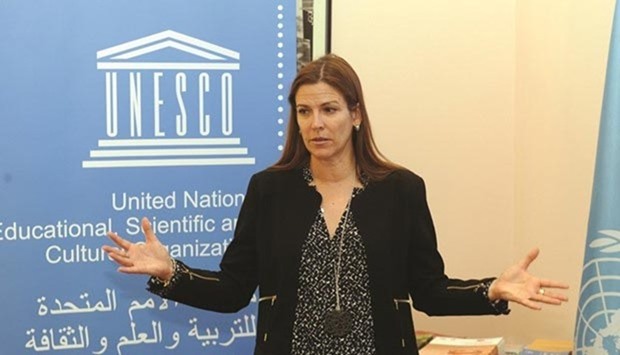The United Nations Educational, Cultural and Scientific Organisation (Unesco) Office in Doha is continuously working with all the ministries in Qatar to implement the sustainable development goals (SDGs), a senior official has said.
Qatar is one of two Arab countries that voluntarily report their commitment and achievements on the SDGs, which have 17 goals, 169 targets and 229 indicators for measuring performance.
“Unesco’s joint programmes with Qatar are working very well, we bring technical knowledge and most of the substance around it but they make the facilitation to reach out the different stakeholders on the field,” Unesco representative for the Arab States of the Gulf and Yemen and Doha director Anna Paolini said.
These programmes cover education; natural sciences, social, and human sciences, culture; and communication and information; among others.
Paolini attributed some of the recent achievements to the strong network of local partners, including government bodies, universities, schools and the private sector in Qatar.
On education, Unesco Doha programme specialist Faryal Khan highlighted the co-operation with national partners in developing policies and strategic planning to monitor national progress in implementing SDG 4, which focuses on quality education for all.
She said their education programme focuses on three strategic objectives: high quality and inclusive lifelong learning for all, empowering learners to be creative and responsible global citizens and leading and co-ordinating SDG 4 Education 2030 agenda.
“We provide technical and policy advice to the Ministry of Education to enable them to strengthen their capacity for educational policy and planning for Education 2030 agenda,” Khan said.
Unesco Doha education programme assistant Maricel Fernandez explained the importance of Qatar National Research Fund-funded research on exploring learning outcomes in GCC countries, including Qatar, which will soon be published.
On culture, Unesco Doha culture programme assistant Bojana Zivkovic focused on some of their initiatives that promote and preserve cultural heritage in Qatar, including the launch of the #Unite4Heritage campaign.
Some 50 World Heritage Volunteers took part in the programme to protect and preserve the Al Zubarah World Heritage site.
Regarding communication and information, Unesco Doha senior programme assistant Marion Desmurger cited their YouthMobile project, which aims to train youth in Qatar about mobile apps development and coding for positive impact.
As regards natural sciences, Unesco Doha has been working with local partners, including the Ministry of Municipality and Environment, to preserve natural heritage in the Al Reem Reserve, a protected area of 120,000 hectares in northwest Qatar.
“The fact that Unesco is hosted in Qatar is a clear reflection of the successful co-operation between our organisation and the multiple institutions here, including the Qatar National Commission to Unesco,” Paolini added.
“Unesco’s joint programmes with Qatar are working very well, we bring technical knowledge and most of the substance around it but they make the facilitation to reach out the different stakeholders on the field,” Unesco representative for the Arab States of the Gulf and Yemen and Doha director Anna Paolini said.
These programmes cover education; natural sciences, social, and human sciences, culture; and communication and information; among others.
Paolini attributed some of the recent achievements to the strong network of local partners, including government bodies, universities, schools and the private sector in Qatar.
On education, Unesco Doha programme specialist Faryal Khan highlighted the co-operation with national partners in developing policies and strategic planning to monitor national progress in implementing SDG 4, which focuses on quality education for all.
She said their education programme focuses on three strategic objectives: high quality and inclusive lifelong learning for all, empowering learners to be creative and responsible global citizens and leading and co-ordinating SDG 4 Education 2030 agenda.
“We provide technical and policy advice to the Ministry of Education to enable them to strengthen their capacity for educational policy and planning for Education 2030 agenda,” Khan said.
Unesco Doha education programme assistant Maricel Fernandez explained the importance of Qatar National Research Fund-funded research on exploring learning outcomes in GCC countries, including Qatar, which will soon be published.
On culture, Unesco Doha culture programme assistant Bojana Zivkovic focused on some of their initiatives that promote and preserve cultural heritage in Qatar, including the launch of the #Unite4Heritage campaign.
Some 50 World Heritage Volunteers took part in the programme to protect and preserve the Al Zubarah World Heritage site.
Regarding communication and information, Unesco Doha senior programme assistant Marion Desmurger cited their YouthMobile project, which aims to train youth in Qatar about mobile apps development and coding for positive impact.
As regards natural sciences, Unesco Doha has been working with local partners, including the Ministry of Municipality and Environment, to preserve natural heritage in the Al Reem Reserve, a protected area of 120,000 hectares in northwest Qatar.
“The fact that Unesco is hosted in Qatar is a clear reflection of the successful co-operation between our organisation and the multiple institutions here, including the Qatar National Commission to Unesco,” Paolini added.


